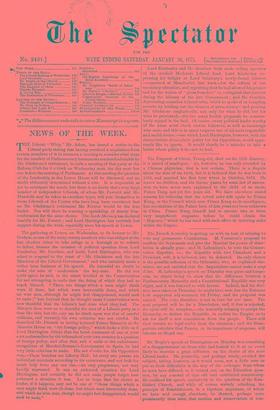The French Assembly is getting on with its task of
refusing to vote any permanent Constitution. M. Ventavon's proposal to confirm the Septennate and give the Marshal the power of disso- lution is already gone ; and M. Laboulaye's, to vote the Conser- vative Republic, i.e., the Republic with two Chambers and a President, will, it is believed, also be defeated. Its only chance is the possible adhesion of the Orleanists, who, as explained else- where, are not satisfied that the Imperialists cannot make a coup d'etat. M. Laboulaye's speech on Thursday was quiet and tempe- rate, its object being to show that the difference between a Parliamentary Monarchy and a Constitutional Republic was very slight, and it was listened to with favour. Indeed, had the divi- sion been taken on Thursday, he might have won, but the Extreme Left supported adjournment till Friday, and the proposal was carried. The vote, therefore, is not in time for our issue. The next proposal will be for a Dissolution, and, if that is rejected, the cycle will be complete,—the Assembly refusing to accept the Monarchy, to declare the Republic, to endure the Empire, or to ask for itself a new commission from the people. There will then remain no legal outlet from the situation ; and the Bona- partists calculate that France, in its impatience of suspense, will tolerate an illegal one.


































